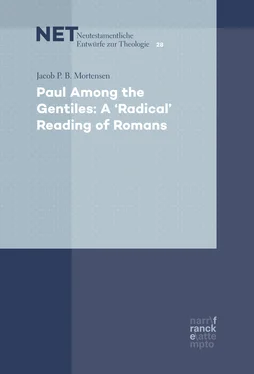Concerning the first reason, even if we argue that Jews probably lived in Rome at the time of the letter (even though Jews were expelled from Rome because of Claudius’s edict only after Claudius’s death in 54 CE to return to Rome), it does not necessarily follow that there were any Jews in the assembly Paul addressed. Neither does it follow that Paul addressed these Jews. Furthermore, even if we can argue that Jews lived in Rome at the time of the letter, we must ask, do we accept that as the point of departure for our perception of the situation underlying Romans, or do we follow Paul’s simple and straightforward statement in his letters that he considered himself to be apostle to the Gentiles (Rom 11:13), since God had entrusted him with the gospel for the uncircumcised, and Peter with the gospel for the Jews (Gal 2:7ff.)? From my point of view, supported by the analysis presented above, Paul was quite clear in his letters: He did not address any Jews with his gospel. Since those are his own words – also in Romans – I do not regard Paul as addressing his gospel to Jews.
Concerning the second reason for contending that Paul wrote to Jews as well as to Gentiles, many scholars assume that since Paul presupposes an acceptance and understanding of Judaism and the Jewish scriptures, the audience must surely have consisted of Jews. Thus, many scholars interpret these implicit inferences as explicit facts. But these inferences constitute a referential fallacy. Paul’s use of Jewish scriptures, and his thorough discussions of Jewish concerns do not necessarily imply that the audience consisted of Jews. The fact that Paul discusses and makes use of these things tells us only that he presupposed the audience’s acquaintance with Judaism and the Jewish scriptures.2 Thus, the audience may well be considered ‘God-fearers’. We know from ancient sources and the LXX that ‘God-fearers’ found the Jewish Scriptures and customs attractive.3 From Acts we know Cornelius, the Roman military officer, whom Luke describes as ‘righteous’ (δίκαιος, Acts 10:22) and ‘pious’ (εὐσεβής, Acts 10:2), a respected man who was known for his alms to Israel (Acts 10:2, 4, 31), and Luke also calls him a ‘fearer of God’ (φοβούμενος τὸν θεόν, Acts 10:22).4 Martial and Plutarch tell us that non-Jews adopted Jewish practices,5 and both (and several others) decried the practice.6 Hence, the fact that Romans is densely filled with Jewish references and concerns does not contradict the fact that Paul explicitly identifies the audience as Gentile. As Thorsteinsson observes: ‘Paul’s speaking about Jews and Judaism does not make the audience Jewish’.7 Thus, the only thing we may infer from the explicit identification of the audience as Gentiles is that they knew Judaism and the Jewish scriptures, because many Gentiles throughout the ancient world found various aspects of Judaism attractive. We should think of these Gentiles in terms similar to ‘God-fearers’ or proselytes, as identified in the previous chapter on terminology.
The Gentile identity of ‘the strong’ and ‘the weak’
In Romans 14:1–15:6, Paul discusses whether ‘the strong’ should yield to the conduct of ‘the weak’. This passage offers critics some of the strongest evidence for a Jewish constituency in the Roman congregation, because the terminology Paul employs is unique to Judaism, and he writes in an oblique manner, as though the audience knows the identities of the two groups involved.1 So the argument is that Jews must be involved.
‘The weak’ try to keep Jewish customs and ‘observe the day’ (14:6f.). They perceive certain food to be ‘unclean’ (14:14), and they avoid meat and wine in favour of a diet possibly consisting of vegetables and water (14:21).2 Therefore, scholars have traditionally identified ‘the weak’ as Jewish Christians who continued to observe the food regulations of the (Mosaic) law, and ‘the strong’ as Gentile, non-law-observing Christians.3 However, the observance of Jewish customs does not necessarily require the presence of Jews in the Roman congregation. The Jewish customs shaped in 14:1–15:6 are precisely the sort of customs observed by proselytes, ‘God-fearers’, or Gentiles affiliated with Judaism who accommodate themselves to Jewish customs. And the controversies reflected in the passage are easily imagined among Gentiles with differing perceptions of the (Mosaic) law. The question concerning the eating of meat could reflect whether or not the meat on the table was considered pure by those observing the (Mosaic) law in this matter. Thus, the problem would be one of commensality – how law-observing Gentiles could partake of a meal hosted by someone who did not scruple to observe the (Mosaic) law on this matter – and not one of how to acquire kosher meat in Rome,4 or a principled stance on vegetarianism or dietary asceticism.5 There are well-known examples of how someone faithful to the observance of the (Mosaic) law restricted their diet to vegetables and water when eating meals prepared by unclean Gentiles ( e.g. Daniel and Esther), and there are also first-century parallels to this solution in Rome.6 Also, in Against Apion , Josephus mentions that many non-Jews observe Jewish Sabbath and food customs:
The masses have long since shown a keen desire to adopt our religious observances; and there is not one city, Greek or barbarian, nor a single nation, to which our custom of abstaining from work on the seventh day has not spread … and [where] many of our prohibitions in the matter of food are not observed. ( Ag. Ap. 2.40)
Philo made a similar statement when he wrote:
[Jewish customs] attract and win the attention of all, of barbarians, of Greeks, of dwellers on the mainland and islands, of nations of the east and the west, of Europe and Asia, of the whole inhabited world from end to end. ( Mos. 2.4)
The point made by both Josephus and Philo concerns the distinction between proselytes and sympathizers. Proselytes are circumcised (and thereby ‘converted’) Gentiles who somehow now have become Jews, even though they may not be considered ‘real’ historical-ethnic Jews by some other Jews (cf. Jubilees 15:26). However, the sympathizers easily present themselves as ‘God-fearers’. The Greek term θεοσεβής, usually translated as ‘God-fearer’ or ‘God-worshipper’, was a Jewish way of describing Gentiles who were regarded as pious by Jewish standards. Jews had used versions of the same expression in Hebrew and Greek to describe the piety of other Jews ( e.g. Abraham in Gen 22:12), but in the late Hellenistic period, ‘God-fearer’ became a designation of pious Gentiles.7 Equivalent expressions include σεβομένος and φοβούμενος τὸν θεὸν. Apparently, the designation θεοσεβής is so broad that Josephus may call the wife of the emperor Nero a ‘God-fearer’ ( Ant. 20.189–196). But it was also used with respect to other Jews in Jewish Hellenistic literature, for example Joseph, in Joseph and Asenath .8 It is doubtful that there were any formal requirements for designating anyone as a God-fearer, but it often refers to Gentiles who were either respectful of the one God of Israel, of the Jewish community and practices, or both.
Along with Philo’s and Josephus’ testimonies, Gentile authors also witnessed to the popularity of Jewish customs among non-Jews. In the works of Juvenal ( Sat. 14.96ff.), Horace ( Sat. 1.9.68ff.), Ovid ( Am. 219), and Seneca ( Ep. 95.47), we may read of Gentiles accommodating themselves to, or being affiliated with the Jewish community and practices. These authors attest to pervasive Sabbath observance among Gentiles. And in the New Testament, we have the clearest evidence of the presence of Gentiles in synagogues on the Sabbath. Acts does not use the specific word θεοσεβής, but instead mentions ‘You Israelites and others who fear God’ (ἄνδρες Ἰσραηλῖται καὶ οἱ φοβούμενοι τὸν θεόν, Acts 13:16). Acts has several references to these pious Gentiles.9
Читать дальше












